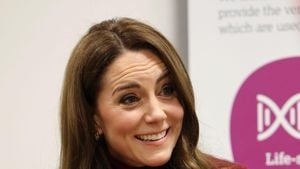Diversity, equity, and inclusion programs are facing unprecedented scrutiny as backlash against corporate DEI initiatives has become increasingly evident across American workplaces, educational institutions, and governmental bodies. Following the election of former President Donald Trump, moves to dismantle such programs accelerated, marking what seems to be the beginning of a broader conservative campaign against these longstanding policies.
On his first day in office, Trump signed an executive order aimed at restricting diversity programs related to federal hiring and funding, which encompassed initiatives like environmental justice. This action was twofold: it sought not only to ban DEI offices but to actively put their employees on paid administrative leave. At the helm of this new direction for the federal government is Elon Musk, now heading the Department of Government Efficiency. Musk's outspoken disdain for DEI, having referred to it as “just another word for racism,” appears to have influenced corporate leaders as well.
Corporate giants including Walmart have begun to retract various aspects of their diversity initiatives, including training programs intended to advance racial equity. This turnabout highlights the growing consensus among some business leaders, such as hedge fund manager Bill Ackman, who have openly criticized DEI efforts on social media platforms. These criticisms have also reached the local level, as seen with Los Angeles Fire Chief Kristin Crowley, who received backlash following her emphasis on DEI recruitment strategies amid catastrophic wildfire scenarios.
“DEI means people die,” Musk proclaimed on social media, reflecting the depth of criticism leveled at DEI advocates who prioritize diversity. Scott Jennings, a CNN political commentator, echoed this sentiment by questioning the effectiveness of DEI initiatives during emergencies: “If your house was burning down, how much do you care what color the firefighters are?” This rhetorical framing has fueled controversy over the fundamental purpose of DEI programs.
Former Vice President Kamala Harris has also become entangled within this backlash. Tennessee Republican Rep. Tim Burchett remarked on her selection as Biden’s vice-presidential running mate stating, “One hundred percent she is a DEI hire,” showcasing how DEI discussions have infiltrated mainstream political discourse.
Interestingly, public opinion on DEI has begun to shift as well. A recent survey by Pew Research Center indicated 52% of American workers viewed DEI initiatives positively, but this number is retreating amid notable pushback from the right. Controversially, 21% of respondents expressed negative views on DEI, indicating there is growing disenchantment with these programs.
Critics argue DEI fosters discriminatory practices by establishing hierarchies of identity categories, wherein advantageous treatment is extended based on race or gender at the expense of others, especially among White Americans. They question whether the focus on increasing demographic diversity undermines merit-based practices and if it serves as merely a smoke screen for political agendas.
Supporters counter these assertions, defining DEI as integral to fostering inclusive workplaces where all employees have the opportunity to thrive. They argue the programs strive to correct historical inequities, dating back to the roots of the Civil Rights Movement, which sought to dismantle systemic discrimination and promote diverse, inclusive hiring practices.
The origins of DEI practices can be traced back to the Civil Rights Act of 1964, which outlawed employment discrimination. Attempts were made to establish equitable hiring practices throughout subsequent decades, yet it wasn't until the murder of George Floyd prompted nationwide protests and calls for greater racial equity within business models. During this period, the demand for Chief Diversity Officers surged—rising 168.9% between 2019 and 2022, according to LinkedIn analyses.
Despite this progress, recent months have seen corporate entities retract their commitments to diversity initiatives. Musk's declarations have catalyzed significant shifts among corporations, with many omitting DEI language from their hiring processes altogether. High-profile critics like Christopher Rufo have articulated their positions, insisting, “These are not neutral programs to increase demographic diversity; they are political programs...”
Opponents often view these programs through the lens of affirmative action, arguing they perpetuate divisive political ideologies rather than achieve genuine equity. Writers from conservative think tanks assert DEI structures inherently propagate racial hierarchies counterproductive to American ideals.
Mark Cuban, minority owner of the Dallas Mavericks, offered a counterpoint to Musk's tirade against DEI, contending, “The loss of DEI-Phobic companies is my gain.” Other business leaders echo this sentiment, arguing against the retreat from DEI positions. They advocate the importance of fostering representative workplaces, noting failure to support DEI strategies could stem from underlying biases and continued hurdles experienced by marginalized communities.
Notable voices within the DEI field, including former Merck CEO Ken Frazier, highlight the potential for DEI initiatives to promote talent development and fairer workplaces. At their core, DEI efforts aspire to recognize and cultivate capabilities regardless of race, gender, or socioeconomic background.
The diverging stances surrounding DEI mark the current political climate as more polarized than ever before. With opinions vying for representation, the question remains: where do we go from here? Will DEI continue to mobilize support and generate meaningful change, or will perceptions of it diminish under pressure? Only time will tell how these discussions will evolve across the sector, as both sides rally to shape the conversation around diversity initiatives.



